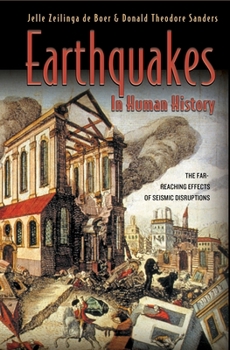Earthquakes in Human History: The Far-Reaching Effects of Seismic Disruptions
Select Format
Select Condition 
Book Overview
On November 1, 1755--All Saints' Day--a massive earthquake struck Europe's Iberian Peninsula and destroyed the city of Lisbon. Churches collapsed upon thousands of worshippers celebrating the holy day. Earthquakes in Human History tells the story of that calamity and other epic earthquakes. The authors, Jelle Zeilinga de Boer and Donald Theodore Sanders, recapture the power of their previous book, Volcanoes in Human History . They vividly explain...
Format:Hardcover
Language:English
ISBN:0691050708
ISBN13:9780691050706
Release Date:December 2004
Publisher:Princeton University Press
Length:304 Pages
Weight:1.26 lbs.
Dimensions:1.0" x 6.0" x 9.3"
Customer Reviews
4 ratings
Not just the best, but the only book that does what it does
Published by Thriftbooks.com User , 18 years ago
Earthquakes are not just natural events; they are messages to our civilizations. "Earthquakes in Human History" is a look at how these 'acts of God' have changed the affairs of mankind from biblical times to the twentieth century. Not just calamities, great earthquakes have also been agents of regime change, sometimes in surprising ways. We are lucky to have their stories told so well here; maybe our own civilization can do better the next time the ground shakes. On About.com I rate this book with five stars, and maybe I'll look for the same authors' similar book on volcanoes.
History Lesson Extraordinaire
Published by Thriftbooks.com User , 18 years ago
This work was more than I expected. I learned as much about anscient history as I did about earthquakes! It is well written and focuses on specific earthquake events rather than over-generalizing on the broad topic. I only wish all the metric distances and measures would have had U.S. conversions in parentheses. All in all, a worthwhile read.
History of Quakes
Published by Thriftbooks.com User , 19 years ago
I have a baccalaureate degree in geology with an emphasis in paleontology, and although I have never actually used the degree, I enjoy reading about various aspects of geology. Earthquakes, volcanoes and tsunamis, all of which are interrelated phenomena, are particularly intriguing as they so often impact human society where ever they occur. Probably one of the most poetic and stirring artifacts of this very fact are the ancient footprints of two of what are believed by some to be our prehistoric ancestors, preserved in the ash of a volcanic eruption at Leotoli inTanzania, Africa. De Boer and Sanders' book, Earthquakes in Human History goes a long way to pulling together the geology and sociology of various seismic events through recorded time. Without a doubt the frailty and vulnerability of the human being is graphically demonstrated in the face of these catastrophic events. The authors begin by examining ancient literature for evidence of earthquakes and earthquake damage in human terms. They look to the authors of the Biblical narrative for evidence of seismic activity in the Levant, and it's effects on the course of history there. Although many of the stories they analyze are very likely to have seismic components irrespective of their ultimate cause, I think that some might well be attributable to volcanic explosions as well. Although not familiar with the geologic activity in the area beyond its part in the rifting activity in the Afar triangle in Africa, I believe that volcanoes are customarily associated with such rifts. Certainly they are in the mid-Atlantic system of which Iceland is a part and in the Rift Valley in Africa itself. Although the Levant/Dead Sea portion is considered a "failed" arm of the rifting system, it might still partake of volcanism. Whatever the cause, the geologic activity in the Levant had a major journalistic impact on the narrators that witnessed them, and on the redactors that structured the Bible as we know it today. DeBoer and Sanders also discuss the various earthquakes and geological phenomena in the Greek world of the pre-classical and classical authors. Both the Trojan epics and the historic narratives of Herodotus and others are examined for the effects of geology on mankind and the course of history. Although they discuss several episodes, they missed my favorite, the massive tsunami that swept away a sizeable portion of the Persian land army when it was about to attack a coastal city-Potidea, as I recall. Seeing that the city was fortified everywhere but on the seaward side from which the sea was rapidly receding, the general determined to attack the city for that side. No sooner did he embark on the attack than a massive wave swept them all away. The authors discuss modern era quakes in England, the southeastern colonial US-an area most of us would consider tectonically quiescent-San Francisico-everyone's favorite earthquake story--Peru, Chili, Nicaragua, and Japan. All these s
A really great reference
Published by Thriftbooks.com User , 19 years ago
This book covers some of the most infamous quakes in the world's history, along with the sociological and economical impact that isn't always considered in historical review. Each chapter details the society that is about to be hit with disaster, describes the quake and damage, and how (or if) the society recovers. From the demise of Sparta, to the fall from grace of the Roman Catholic church in Portugal, to the rise of San Francisco from the ashes, this book is an entertaining and informative read. The unpredictable effects of these disasters is interesting and valuable knowledge, as future disasters can and will present some of the same issues. I couldn't put it down!






